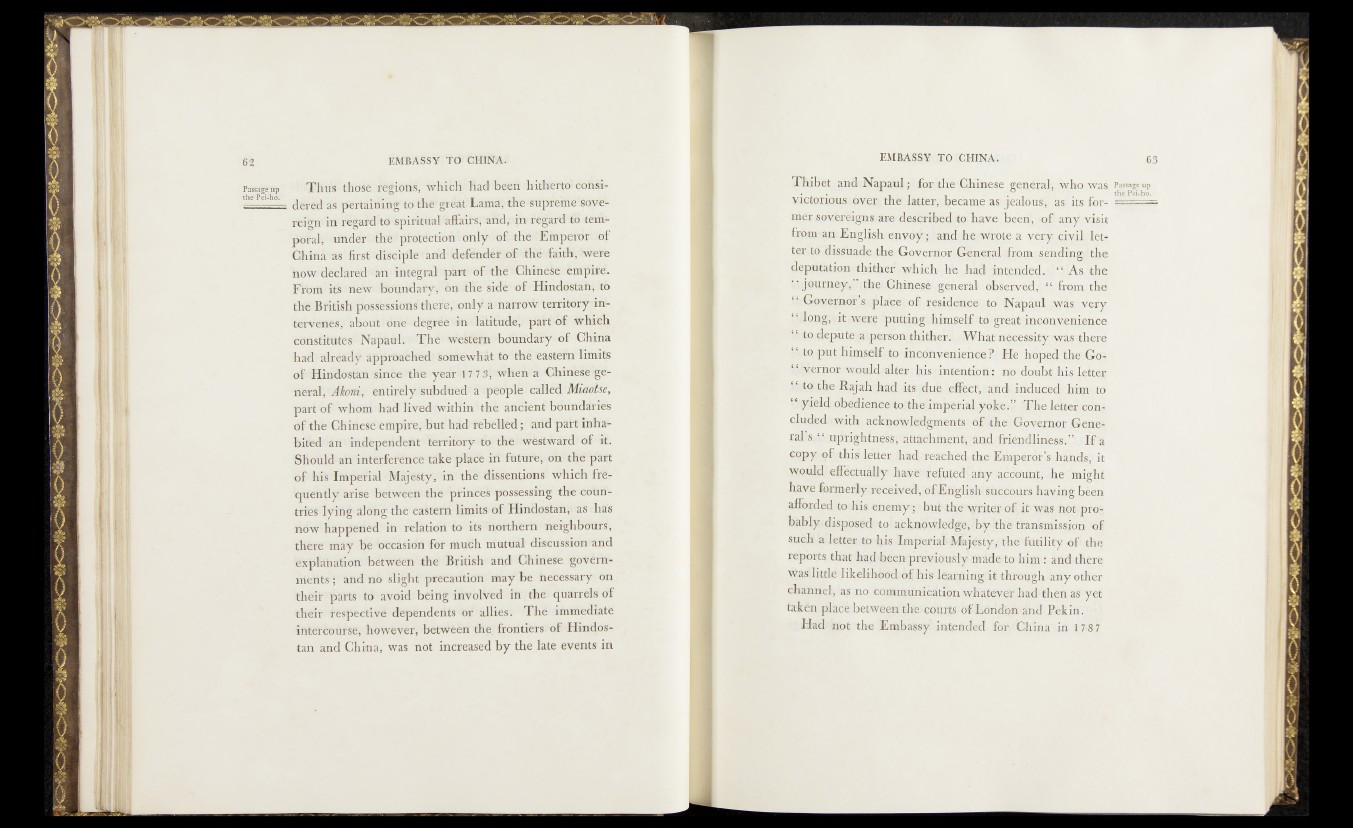
Thus'' thdgg Jl^fons, MiitHf/Haii'been bkfertot qoM&
doted^jpertaining tdtfo? gtfetTamav&e^trp^emefSc^i*«5-
ill iSgaid
pbrah, unddr” the p i^ e d o n onlybof the EropqiDEtfiaf
ChfoiPatillrsbhkciple i and hefondeflof :IS^Sifcbi, Iwere
kow ^ Befelarejh-' an' integral? part of the^OMaelmempird
Flbitoits new bdhrtdary, onrffle side of Hindostah^to
the British p©3sfe&dtt^fih&fe,-onIy a narro'vv tejritoryiiini-
ter¥enisyiabotftidli^'dogrde ojn iil'aiitildoi partlbf which
constitutes' Napaul. Th e' Weltfefft-'iicrUnd^y of ,Ghan'a
had • already approached Some wMfelfor! tbd Eastern limits
dfc Hindostan Since th©3yig^r ’>P7i7:ht f When^a' ;Gh'irl*eSe%df-
neral, Akoni, entirely subdfiedrd'fpfedpld^aM^i^Miffie^«?,
p fff ©T whom had lived witHin th& ’affilieniffodfoffildfciBs
•Of jthb Ghirtesd teftipire^But hMlObetfed y (arid paltdnha^-
bitted in independent territory f fof ebe^iWdSt^ardj o©®L
•Should ah intllflitenss take place irbfuturte; on the part
Of his Imperial Majesty, in the dissentions which frequently'arise
between -the printeteb possessing the edit fifties
lying alohgAhif^i&tefn limits of Hindostan^ J®s (Adis
bdw^liappihetF in relation to ifs 'hnrtherh sweighbe^hfS,
thfefb may ffe-^Otedasidn for mudh mutual diseussionvand
e&plkhation bA ^ e n the British andrGhimese. tgever®-
ntehts ;i Mid no shghrpretautidn may be hebessaryi on
to aYhid being involved in j^ iis ^iiarrbls of
tbi}r^4%|^fe^ftYd dependents < Of alliesI The immediate
iiMtiOMsej howfeYer, between thbjltoiitiers OPTiindoS-
tan and China, was not increased by the late events ih
Th ib ^ || unäßMatpaul; for itHeChinese general, who was
Vii.ct^riou&^eyfe^thfei 1 Mt cry;becan|p'arsi yealous\j as its for-
mdr ^i5^^gO>siat©desbri<h?ed to^ have'been* >of; any visit
ffPim'anKEi^lishj en y d ^ ^ an p h'^jtivfcbte a yesrmjsLvil let-
6orqd30i'Ssuffd^|%e(5&0yeiM'oij>&4ne^af from »eiifiij0|p the
deph&fmn-vthithe^'^iyhichh'd „had mtpprdg’d. •> ‘tIAs. the
^hjöwrney;^ ‘theiiChki^i^ne»al> ^ ^y ^ ^ ^ f-V from th4
sjplace^ofl fe'sidei^e^1|i||>^^p Iiul uw äs; vefiy
dslong^oitii^saie IputdngfdMtnself? inconvenience
f t^fÄpOrsdm thithefv Whät rf^ö;e^|£^^3Si,titherQ
A is to tpjffltfhimself.ito JOedn venieked^i' ihe Gai
\4|fer1gQ^ewo.uld älter Ijiis^imfentipn«: ttdiddubtihij&l|lt£j5
udoLthe Rajah had fts!;du^|e'f|g£^;i<aöd* induced him- td
“jpieldeobediencöffibphel imp'e-M&I yoh-0?i| The lett-er!6®M|
oinefeihewith a'öMdWtödgmintSSOf^f^öyitnOf G&n'&
räljsn^^^ightn^phfetg©l^ ^ yabtdtffi^ndlinfcsy^>. ’ ’ I f f
eopy/^f thi^^ter.lh'a^ir^^hbd'.theJ&qpärlr’svliah’dSVit
VfOwJidielföetuaily ’haye^ifüte-d ^he" 'might,
have formerly receiyed^öf E tfglishi’s ' ü rs hhving bqbfi
afforded todiis elaemy^P bubt-he'J'\yrite^v6^ kvWas nptiprojs
bäbly. disposed* to* äcknowledgi^^b^tbe^transmislsio^ -'of
such y iettesto fos Impe-Mal* Mbj^s'fy/!the fudlif^dfbthe
reports that hap4de^preVidus^3ffid^|t^Mm: and there
Wasilittle likelihbotbof hh>il^rnin|f i-fe thtonghrkhy Other
ehanoiel, noüfcqmmunicatibn -v(jh(ä tevOibh a d* Ih eh 3svyet
taikbn jdaOe betweO0i#]^Gdur,täfofbdndl)h-*änä'Pekin. ; ;
Had -not the Embassy intended fo^dC-hi|)’afXih i 718,f
Passage up
tK^Pei-ho.